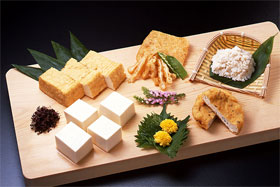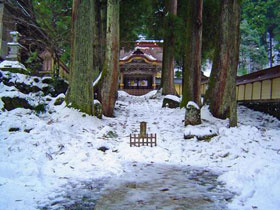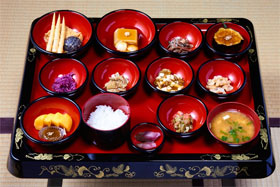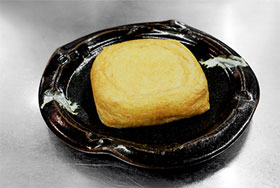

The Tale Behind Fukui’s Love for Abura-age
|
Did you know that the people of Fukui prefecture consume abura-age (fried tofu) twice as much as the national average? Compared to elsewhere in Japan where fried tofu is usually found in thin sheets, in Fukui, this particular tofu dish is thick and fluffy on the inside. It has been a favourite of the local people since long ago, and the reasons are deeply rooted in history.
Around the 6th century, Buddhism was introduced to Japan, and this included the traditional cuisine of Buddhist monks as part of their devotional practice, also known as shojin ryori. One significant characteristic of this is that it has no animal products at all, due to the principles of non-killing and compassion for all living things. Eiheiji Temple was founded by Dogen Zenji in Fukui in 1244, and this temple is one of the head temples of the Soto school of Zen Buddhism in Japan. The founder also compiled a text known as Tenzo Kyokun (Instructions for the Cook), which formed the basis of today’s shojin ryori. As suggested from its name, the text is addressed to the head chef of a Zen temple, for the preparation of meals for the monks as well as offerings to the Buddha. Some of the key points consist of being aware of and respecting the ingredients as plants have life, to prepare them carefully in order to avoid waste, as well as cooking with the eater in mind. All of these is connected to preparing the food such that it is easy to eat, with a clean and modest appearance. Both cooking and eating are part of the religious practice. Hence, while shojin ryori might seem plain at first, it actually is meant to enhance the appeal of the food. With Eiheiji Temple being the source of shojin ryori which gradually spread to the rest of Japan, as well as the presence of many other shrines and temples in Fukui, it is no wonder that Fukui’s traditional food is heavily influenced by Buddhism culture. With Fukui’s culinary culture revolving around vegetarian cuisine, this has led to tofu becoming a primary source of protein. The preparation process also relates back to its principles. Abura-age looks like a simple dish, however making it requires much care and effort, whether it is mashing the soybeans or squeezing them to collect soymilk. Besides that, a major event, Hoonko, is also held in Fukui around the death anniversary of the founder of Jodo Shinshu, otherwise known as Shin Buddhism. During this period, there is a custom of preparing and eating vegetarian meals. This has influenced people to not only eat the standard vegetarian dishes such as abura-age and suko (vinegared red satoimo stems) during Buddhist services and festivals, but also at home. As a result, the fried tofu dish gradually transformed into a common household dish. If you ever visit Fukui, we hope that you have a better understanding of the background behind its local cuisine, especially the abura-age. Besides the traditional styles, today, we can also see abura-age served creatively in modern dishes, such as tofu sandwiches, tofu steak or even tofu pizza! |
 © Web Japan  Eiheiji Temple © photoAC  Tenzo Kyokun © Tenzo Net  Shojin Ryori © Web Japan  © Ministry of Agriculture, Forestry and Fisheries |
Resources
|
Miyata, Kosuke. 2014. “The Proud Traditional Food Culture of Japan’s “Best” Prefecture”. Kyodoryori-story. Accessed 22 February. http://kyoudo-ryouri.com/en/journey/3095/3. “Shojin Ryoji – Today’s Hot Topic”. 2022. Web Japan. Accessed 22 February. https://web-japan.org/trends/11_food/jfd202202_shojin-ryori.html. “Fukui”. 2022. Ministry of Agriculture, Forestry and Fisheries. Accessed 22 February. https://local-cuisine.maff.go.jp/en/areastory/1403/. “Shojin Ryori: a Sustainable Culinary Tradition from Fukui”. 2022. Fukui Prefecture & Fukui Prefectural Tourism Federation. Accessed 22 February. https://enjoy.pref.fukui.lg.jp/en/discover/stories/shojin-ryori-sustainable-culinary-tradition-from-fukui/. “Fukui Favourites”: Everyday Casual Meals”. 2022. Fukui Prefecture & Fukui Prefectural Tourism Federation. Accessed 22 February. https://enjoy.pref.fukui.lg.jp/en/discover/stories/fukui-favorites-everyday-casual-meals/ . |
|
Japan Creative Centre 4 Nassim Road, Singapore 258372 +65 6737 0434 / jcc@sn.mofa.go.jp https://www.sg.emb-japan.go.jp/JCC/ Nearest parking at Orchard Hotel & Delphi Orchard |
 |